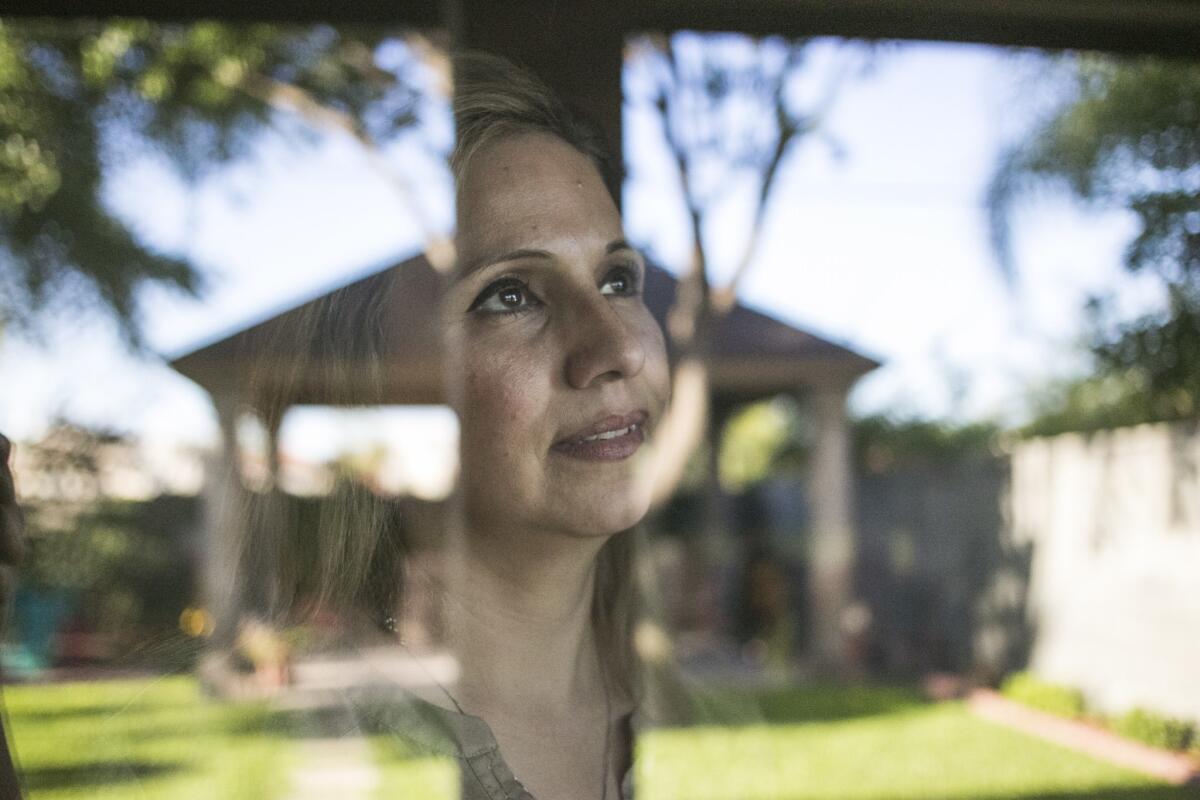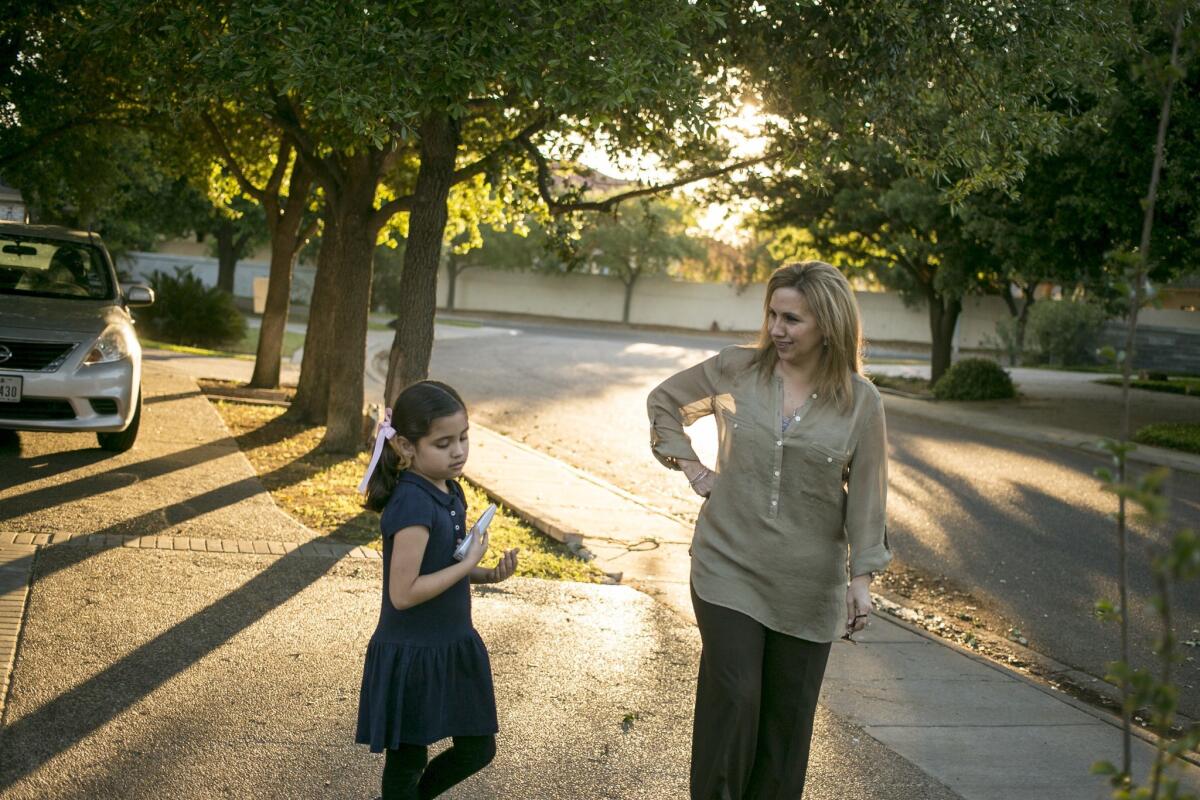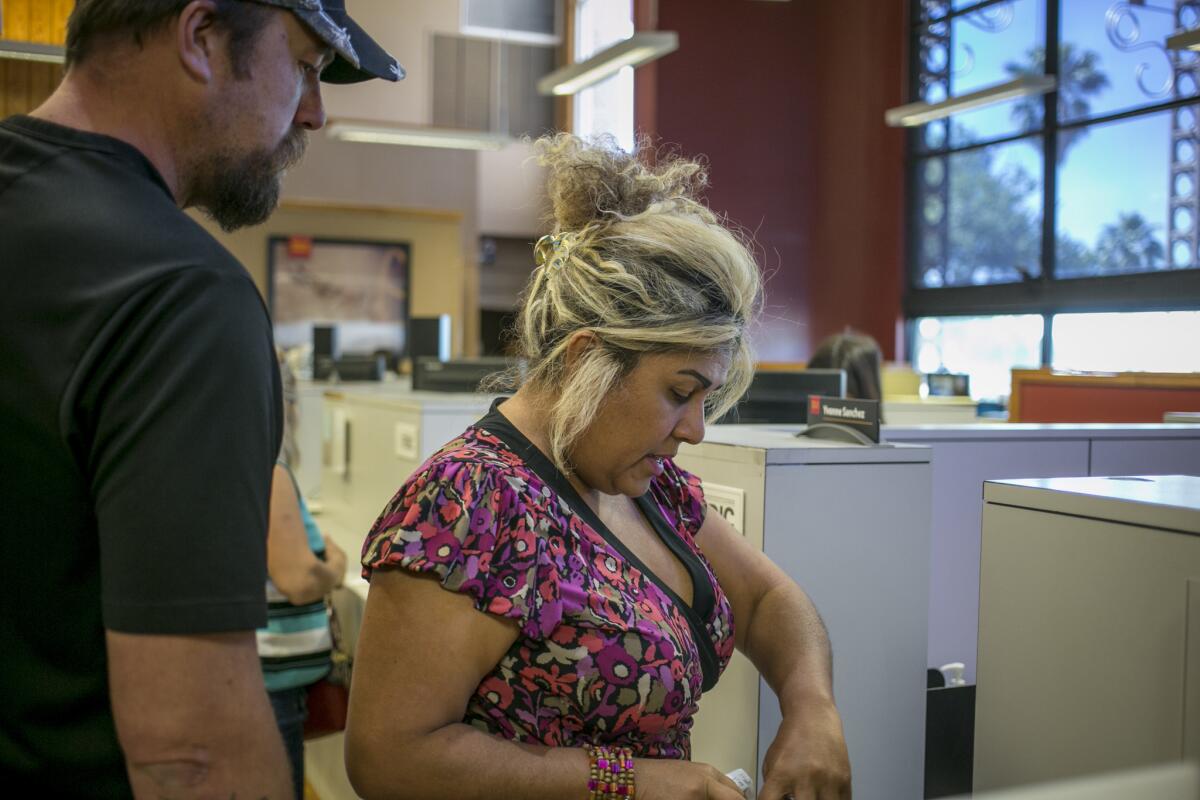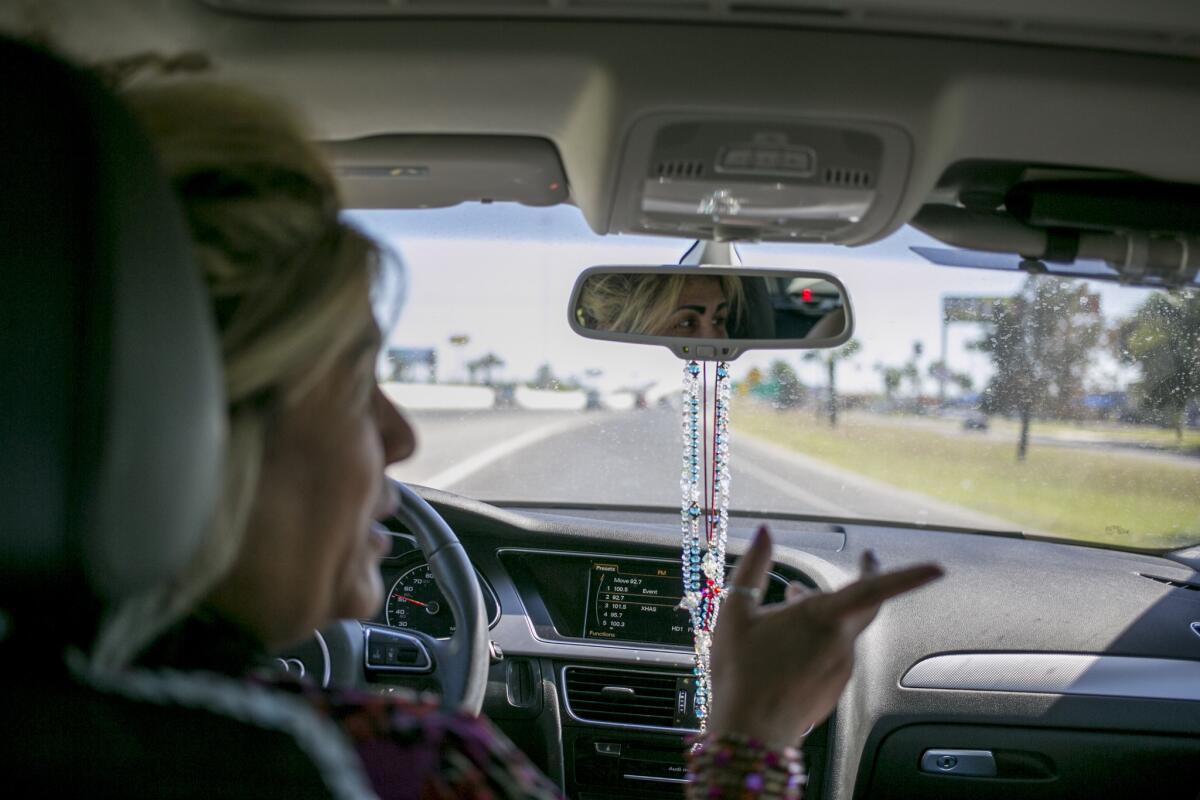Inside Trump Nation: How Donald Trump scored a win in Texas border country
Patti Magnon grew up on the other side of the Rio Grande — in the adjacent Mexican city known as Nuevo Laredo.
But the border here has never been a barrier, and Magnon, who has lived on the U.S. side now for years, feels at home in both. “Proud to be an American & a Catholic!” proclaims her bio on Twitter. “Love my Mexican heritage! An immigrant is not the same as an illegal immigrant.”
These days, Magnon sometimes feels she has more in common with Americans elsewhere across the country than with Latino families here in Texas, and that started when she told people she was voting for Donald Trump.
Election 2016 | Live coverage on Trail Guide | April 26 primary election results | Track the delegate race | Sign up for the newsletter
“They bash you,” said Gina Gil, who’s also joined a small but enthusiastic group of people here on the border who like what Trump has to say — especially about immigration, a subject that, here on the banks of the Rio Grande, they feel they know as much about as anybody.
“I find it insulting when people say people who follow Trump are uneducated, unintelligent,” said Magnon.
“Te aventaste!” Gil exclaimed. “You hit it.”
Across the country, only a small minority of Latinos have backed Trump, and even here in Texas, a plurality of Latino Republicans voted for home-grown U.S. Sen. Ted Cruz, who won the March 1 primary with 44% of the overall vote to Trump’s 27%. Now as ever, most Latinos vote Democratic, and in Texas, where Latinos make up more than a quarter of the electorate, up to 71% of them backed Hillary Clinton, according to exit polls.
It was here on the border that Trump scored his biggest Texas victories, capturing Laredo’s Webb County, which is 95.3% Latino, and Zapata County next door (94%), as well as Terrell County (49 17.4% Latino Hispanic) and Hudspeth County (78%), which are farther west.
“It’s the hardworking people,” said Miriam Cepeda, 24, a history major at the nearby University of Texas-Pan American who is leading Trump’s campaign in the Rio Grande Valley east of Laredo. What she hears, she says, is a lot of resentment aimed at undocumented immigrants who receive government services. “Those that pay the taxes and do what they’re supposed to say, ‘Why do I have to pay?’”

Trump supporter Patti Magnon of Laredo, Texas, began life across the border in its Mexican sister city, Nuevo Laredo.
Magnon and Gill voted for Trump in the Texas primary, plan to vote for him in the general election, and are waging their own kind of ad hoc citizens’ campaign, praising him on radio shows and online, recruiting friends and family.
The two women met last summer when Trump came here, to the Southwest border’s third-most populous city, behind El Paso and San Diego.
Magnon drove her 7-year-old daughter, Allie, to the small local airport to see the real estate magnate. They were greeted in this majority Democratic, heavily Mexican American town by a crowd of opponents chanting into megaphones: “Dump Trump!”
See the most-read stories this hour >>
Both Magnon, 44, and Gil, 49, are former Democrats — working mothers with community college educations who say they’re alarmed about welfare fraud, illegal immigration and the rising costs of healthcare. Magnon almost lost her health insurance when Obamacare took effect. Gil seethed at paying an $800 penalty under the new federal healthcare law, but insurance would have cost even more.
Trump promised to run the country like a business and repeal Obamacare. They didn’t think he was racist when he promised to build a bigger border wall to keep out Mexican “rapists.” They thought he was right — and were delighted to find that others around town agreed with them.
“I was surprised other people in Laredo think like I do,” Magnon said.
Gil’s father was an electrician, her mother a day-care worker. Raised on the south side of town near the river, she was a cheerleader in high school but was pregnant with the first of five children at age 16. She helped her husband start a bakery. But the union was not a happy one, and Gil eventually left, working multiple jobs, training as a paralegal, buying rental properties and businesses.
The tough-talking single mother relied on undocumented Mexican migrants to watch her children and run her businesses — but at least none of them were on welfare, she says. “I could never have done it on my own,” she said. “I’m not Wonder Woman. You have to keep your boat afloat.”
She says she spent many years working so hard that the only time she saw her children was when she drove by her house and waved at them through the front window.
Gil still lives near the Rio Grande. Tooling around in her custom 2015 white Audi recently, she pointed to homes and businesses she had bought, all for cash. When she stopped to pick up her blood pressure medication, $71.75 for a month’s supply, she pointed to the button for the state welfare benefit, “Lone Star,” for those who are receiving state assistance.
“Do I press ‘Lone Star’? Ha!” she said, then paid out of her own pocket.
Gil called a local bilingual radio show recently to praise Trump’s promises to crack down on welfare cheats.
“Trump is right. Just because he’s a billionaire — well, he worked hard for what he has,” she said.
Unless someone stops the flow of illegal immigration and stabilizes the economy, Gil worries, “Our kids are going to be working like psychos for the deadbeats.”

Patti Magnon, with daughter Allie, 7, in Laredo, Texas. The family hasn’t visited Nuevo Laredo, Mexico, in years for fear of violence.
Magnon worries about many of the same things. She and her siblings spent their childhood in Laredo’s Mexican sister city, Nuevo Laredo. Her father worked for an import-export business, her mother for a chain of retail stores. The family had an extensive staff including a driver and housekeeping staff.
When Magnon was in high school they moved to Laredo, where she married 22 years ago and settled with her husband, an oil company manager, in a northern subdivision near the country club.
“People say, ‘Why do you say you’re Mexican?’ Because my people are Mexican and American. People think we’re second-rate citizens and we’re not,” she said. “We come to the U.S. and have so much to offer other than we’re just illegals.”
Magnon remembers visiting her grandmother’s house by the river, where migrants would arrive wet and hungry. Her grandmother provided water, taquitos and coins to the temporary workers, who inevitably returned to their families in Mexico. Now, Magnon said, migrants who cross illegally seem to stay and apply for welfare, such as the federally funded Women, Infants and Children program (WIC), which provides food, healthcare referrals and nutrition education to low-income mothers with young children.

Gina Gil fears her children will have to work hard just to provide services for people who have immigrated illegally.
“Living in a border town, I’ve seen how it’s changed, where the maids we have here, illegally, they’re not leaving. They’re having kids here, they get Medicaid, food stamps, WIC. It is just unbelievable what they get,” she said.
Magnon is deeply religious, and feels conflicted at times about how to best help immigrants.
When Laredo and other border cities saw an influx of Central American migrant families and children two years ago, Magnon drove to the local Greyhound station with donations. “They’re coming over here because [of] what they’re promised,” Magnon said. “But at the same time, who is going to pay for all the entitlement programs?”
She hasn’t crossed the border with her family in a decade due to the escalating violence in Mexico, and her youngest daughter has never crossed. A friend’s husband did, and was kidnapped and held for ransom.

Gina Gil feels that she’s worked hard to make her own way, and that Donald Trump has too.
“That makes me so sad — because I have walked those streets,” Magnon said, eyes tearing as she thought of her three girls. “I want them to know where I was raised and their heritage.”
When she hears Trump talk about building a wall to keep out those not legally entitled to enter the country, she isn’t offended. She’s reassured: “He said the Mexicans who are crossing are rapists and murderers. Well, he’s right. He’s not talking about us. He’s talking about the illegals.”
Both women see the New York businessman as the only one who can make a change.
Magnon voted for Hillary Clinton in 2008, but now considers her corrupt. She had high hopes for President Obama before she saw how he handled immigration and national security.
“He always lets me down. Sometimes I think, ‘Are you proud to be an American?’”
Trump, she said, “made me feel safe. He’s that fighter. He’s so proud to be an American.”
During breakfast not long ago at Eduardo’s, a Mexican steakhouse full of saddles and mounted deer heads, Gil stopped the Latina waitress to ask whom she was voting for, and what she thinks of Trump.
“What Trump is saying is true,” Teresa Castro replied.
The server said she works four days a week for $45, no benefits, and has struggled to care for her epileptic husband. She applied for Medicaid but was ineligible.
“We’re all in the same boat,” Gil told her.
Gil and Magnon say they fear for their children’s future. Gil worries her kids will have to work as hard as she did.
“They’re going to live the same life I lived,” she said ruefully.
The women picked up and prepared to join their families — Gil’s at a barbecue, Magnon’s at church.
“Well, hopefully not,” Magnon said. “If Trump is elected.”
Follow Molly-Hennessy-Fiske on Twitter
ALSO
Indiana relishes its surprising spotlight in the GOP race
Trump, Kasich and Cruz make their cases to California GOP: on unity, electability and fish
As Cruz (once again) secures more delegates, Trump camp (once again) calls process unfair
More to Read
Start your day right
Sign up for Essential California for news, features and recommendations from the L.A. Times and beyond in your inbox six days a week.
You may occasionally receive promotional content from the Los Angeles Times.







